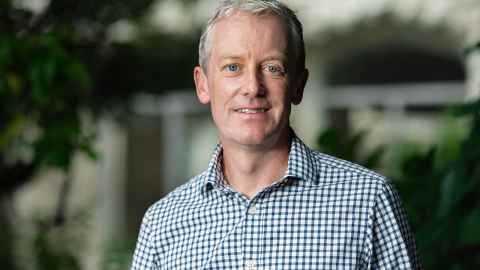Erik Lithander: angels, devils and spicy kofta curry
27 May 2024
Coming to terms with the contradictions related to sustainability, and finding a workable balance, is one of the University’s great strategic challenges.

We’ve all been in situations when attempting to satisfy two equally legitimate and well-meaning objectives leaves us underwhelmed on both counts. Like that Sunday evening in Dublin a few years ago when I decided to surprise my wife with a homecooked spicy kofta curry from a recipe I found on the internet. The instructions were impossibly elaborate, the ingredient list endless and the preparation took much longer than I expected. Then, in the final stages, I discovered I was missing one of the exotic Indian spices listed in the recipe, so I traipsed the length of Terenure Road to find it. In the end, although I was faithful to the recipe, dinner got served at 11pm and it wasn’t even particularly nice.
The University’s commitment to sustainability, exemplified through Te Rautaki Aronga Toitū, our new sustainability strategy, is rife with challenges to our status quo: pretending otherwise would be disingenuous. As the country’s foremost university, we have an absolute obligation to show leadership in sustainability; not only in how we run the institution, but also in how we mobilise our research and education in support of sustainability locally, nationally and regionally. We have hundreds of world-leading sustainability specialists on campus; many of them are affiliated to Ngā Ara Whetū, our new Centre for Climate, Biodiversity and Society. Simultaneously, equipping our 46,000 students with critical skills and knowledge relating to sustainability will help them make sustainable decisions for themselves and their communities in the years to come.
At the same time, we frequently have to prioritise important activity that seemingly contradicts our carbon-reduction ambitions. Much of our research is carbon-intensive, yet our research breakthroughs add to the critically important corpus of knowledge that will hopefully guide us to a healthier, more prosperous and more sustainable future.
As the country’s foremost university, we have an absolute obligation to show leadership in sustainability.
International students? We have around 8,000, making a massive contribution to the dynamism of campus life. Unfortunately, their travel to and from New Zealand accounts for 40 percent of the University’s total carbon emissions. Incidentally, our $200m in annual international student tuition fee income funds research infrastructure, student services and other essential university operations that would not be possible if we relied purely on government funding.
International travel by staff also accounts for 40 percent of the University’s carbon emissions, but is arguably necessary to maintain international collaborations, disseminate our research findings and allow our colleagues to participate in important expert working groups and panels internationally. Our position as a world-leading (and highly ranked) university is meaningfully reliant on such engagement.
The scale of the University’s philanthropic fundraising also requires significant face-to face activity, much of it in major cities offshore. The generosity of these donors unlocks innumerable equity and diversity initiatives, scholarships and groundbreaking research projects.
In essence, all these activities come with a meaningful carbon cost, but without them we would simply not be able to deliver the positive change to our communities that we do.
So, where does this leave us? As someone who feels these contradictions particularly acutely (I am simultaneously the strategic lead for many of the University’s externally facing activities, such as student recruitment and fundraising, as well as being the strategic lead for sustainability), I like to tell people that I go about my business with an angel sitting on one of my shoulders and a devil sitting on the other, both incessantly yabbering paradoxes into my ears.
Coming to terms with these contradictions, and finding a workable balance, is one of the University’s great strategic challenges. The angels and devils on our shoulders won’t quieten anytime soon, but with our public commitment to be Carbon Zero by 2030, we must move quickly, honestly and with conviction.
Oh, and flick me an email if you want that spicy kofta curry recipe. Or, better yet, don’t.
This article first appeared in the Autumn 2024 edition of Ingenio.